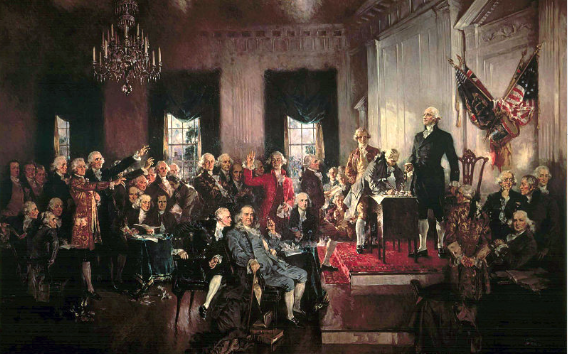Luther Martin Defends Elbridge Gerry: January 1788

It's easy to get the impression that the Constitutional Convention was a harmonious venture; however, there was actually a lot of angst and anger at times. For instance, Robert Yates and John Lansing, delegates from New York, left the convention and actively fought against ratification. Other members, like Col. Mason and Gov. Randolph from the Virginia delegation refused to sign the Constitution. Other Revolutionary War luminaries refused to even attend the Convention: Patrick Henry famously said that he "smelled a rat" in the proceedings.
At one point in time, Luther Martin, delegate from Maryland, felt the need to defend fellow attendee, Elbridge Gerry (Massachusetts) against a false charge that he had advocated for the controversial idea of a "redemption of continental money according to its . . . nominal value."
Elbridge Gerry opposed the Constitution on various grounds. In his defense of Gerry, Martin revealed an interesting anecdote concerning Gerry's opposition. That is the focus of this post.
August Glen-James, editor
And some time before I left Philadelphia, he in the same public manner declared in convention that he should consider himself a traitor to his country if he did not oppose the system there, and also when he left the convention.
I also declare to the Public that a considerable time before I left the convention Mr. Gerry’s opposition to the System was warm and decided; that in a particular manner he strenuously opposed that provision by which the power and authority over the militia is taken away from the States and given to the general government; that in the debate he declared if that measure was adopted it would be the most convincing proof that the destruction of the State governments and the introduction of a king was designed, and that no declarations to the contrary ought to be credited, since it was giving the states the last coup de grace by taking from them the only means of self preservation.
The conduct of the advocates and framers of this system towards the thirteen States, in pretending that it was designed for their advantage, and gradually obtaining power after power to the general government, which could not but end in their slavery, he compared to the conduct of a number of jockeys who had thirteen young colts to break; they begin with the appearance of kindness, giving them a lock of hay, or a handful of oats, and stroaking [sic] them while they eat, until being rendered sufficiently gentle they suffer a halter to be put round their necks; obtaining a further degree of their confidence, the jockeys slip a curb bridle on their heads and the bit into their mouths, after which the saddle follows of course, and well booted and spurred, with good whips in their hands, they mount and ride them at their pleasure, and although they may kick and flounce a little at first, nor being able to get rid of their riders, they soon become as tame and passive as their masters could wish them.
In the course of public debate in the convention Mr. Gerry applied to the system of government, as then under discussion, the words of Pope with respect to vice, “that it was a monster of such horrid mien, as to be hated need but to be seen.” And some time before I left Philadelphia, he in the same public manner declared in convention that he should consider himself a traitor to his country if he did not oppose the system there, and also when he left the convention. These, sir, are facts which I do not fear being contradicted by any member of the convention, and will, I apprehend satisfactorily shew that Mr. Gerry’s opposition proceeded from a conviction in his own mind that the government, if adopted, would terminate in the destruction of the States and in the introduction of a kingly government.
Source: Farrand, Max, ed. The Records of the Federal Convention of 1787. Volume III. Yale University Press. New Haven and London, 1966.
